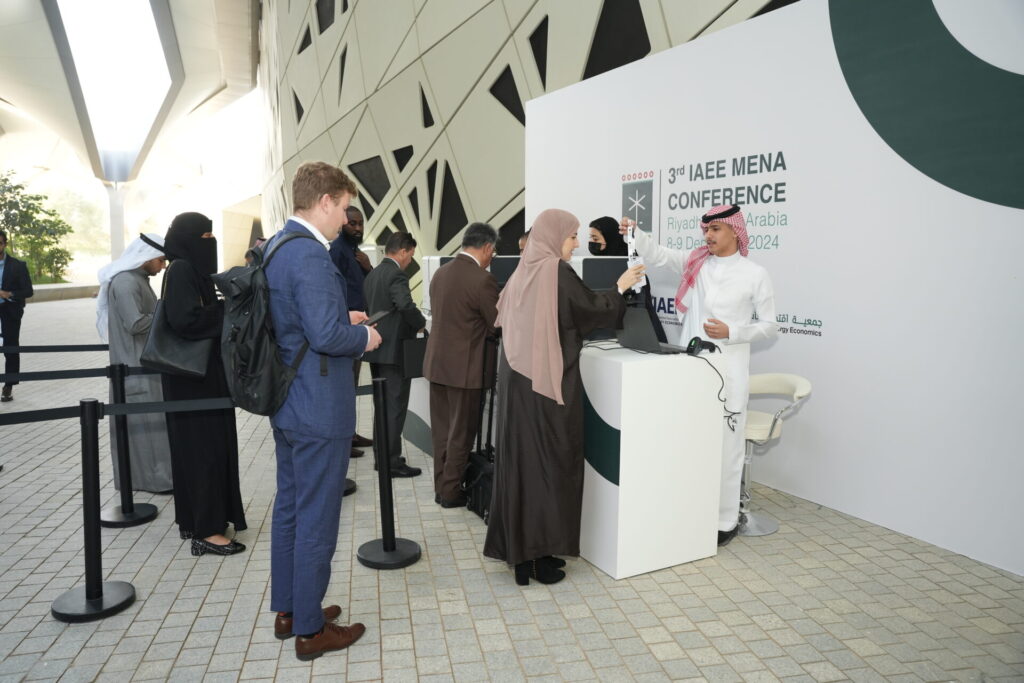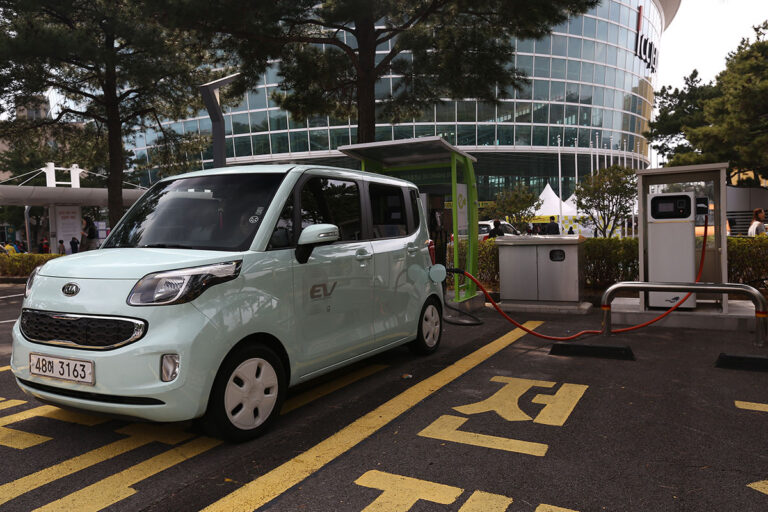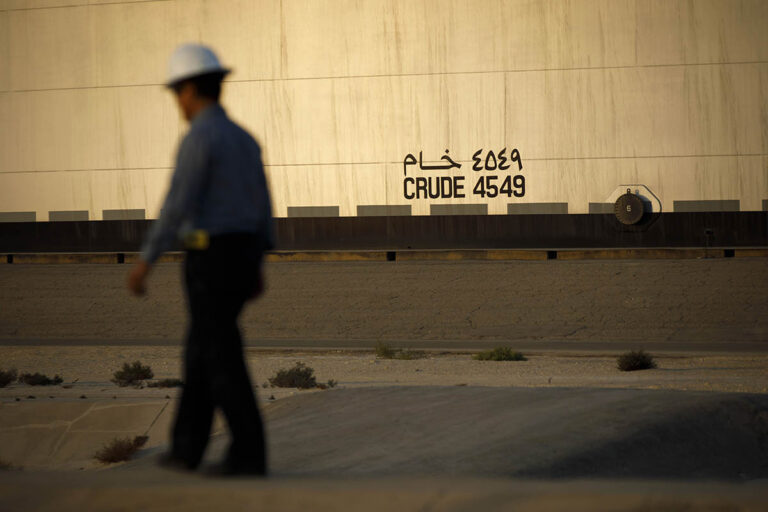Energy economists from academia, industry and governments across the world converged at KAPSARC to assess the role of the Middle East and North Africa (MENA) region in the global energy transition at the International Association for Energy Economics (IAEE) MENA Conference.
The conference, which is the third of its kind in the MENA region, was hosted by KAPSARC and the IAEE’s Saudi affiliate, the Saudi Association for Energy Economics (SAEE) from December 8-9. This follows KAPSARC’s hosting of the prestigious, 44th IAEE International Conference in Riyadh in 2023, which was a first for the MENA region.
“Other regions around the world have a long-established tradition of smaller, regional conferences that support the IAEE, which was founded in 1977. The MENA region is now establishing this tradition,” says Brian Efird, Executive Director of Strategic Partnerships at KAPSARC. The two-day event featured plenary and concurrent panel sessions, offering a collaborative platform for economists, academics, researchers, institutional leaders, decision-makers, industry stakeholders, policymakers, and corporate executives to engage in productive discussions and exchange research and insights.
Targeting research relevant to the MENA region, the conference’s theme was Domestic Energy and Economic Transformations in a Transitioning World. “The value of such an event is in both learning about the varied research about the region, and networking with peers working in similar fields and on complementary topics,” Efird says.
“Academic and evidence-based research is critical for the MENA region and the world to address the twin issues of energy and climate change.”
Brian Efird
Three plenary sessions addressed different aspects of energy economics: the energy transition and unique regional challenges; financing the energy transition; and diversification of MENA economies as part of the energy transition. Smaller, concurrent panel sessions allowed more than 100 scholars to present their work to their peers.
The event also focused on issues relevant to the region and cover a range of topics in energy economics and sustainability. Participants analyzed the unique role of energy in the region as the world reduces and seeks to eliminate greenhouse gas (GHG) emissions. They examined and discussed how the region is adjusting to the evolving energy landscape and responding to changing global energy supply and demand.
A holistic approach to the energy trilemma
Research-based presentations highlighted potential solutions to the energy trilemma: how to balance the affordability of energy while maintaining energy security and stable sources of energy supply and simultaneously fostering a sustainable energy system. The MENA region showcased the variety of national circumstances that countries face when seeking to manifest solutions that address the tension inherent in the trilemma.
Research presented at the conference reflects the diversity of approaches necessary in the area.
Guiding domestic energy and economic transformations in a transitioning world demands a holistic approach that integrates technological advancements, policy reforms, and socioeconomic factors. Technological advancements including renewable energy technologies, advanced energy storage solutions, smart grid infrastructures and digitalization of energy systems, alongside nature-based solutions to reduce GHG emissions, and carbon dioxide removal (CDR) technologies are expected to help the region, and ultimately the world, transition to a resilient energy economy.
The conference offered opportunities to discuss potential policy and techno-economic solutions while promoting a culture of academic, evidence-based problem-solving and constructive dialogue, enabling meaningful contributions to the global energy and economic debate.

Regional challenges
The MENA region includes a heterogeneous set of countries with diverse economic, social, and political circumstances ranging from developing countries with minimal domestic supply of low-cost energy, for example Somalia, Sudan, and Yemen, to large hydrocarbon producers.
Most MENA countries have signed the 2015 Paris Agreement. The legally binding international treaty that deals with climate change mitigation, adaptation, and finance signals the regions’ collective commitment to limit GHG emissions and adapt to the impacts of climate change. However, the drive for sustainable energy must be balanced against the other two legs of the trilemma that, in turn has shaped the response of MENA countries to implementing the Paris Agreement.
“The value of such an event is in both learning about the varied research about the region, and networking with peers working in similar fields and on complementary topics.”
Brian Efird
Many parts of the MENA region are highly vulnerable to climate change impacts, facing significant environmental, economic, and social challenges due to the arid and semi-arid environment. With temperatures rising faster than the global average, the region is projected to experience extreme heatwaves in coming decades, putting public health at risk and increasing energy demand for cooling.
As one of the most water-scarce places in the world, the region is also expected to cope with reduced rainfall and severe water shortages, which will affect agriculture and food security. Rising sea levels may threaten coastal areas, displacing population, and the associated saltwater intrusion will shrink available agricultural land.
Energy diversification challenges
Oil and gas producers from the Arabian Gulf have taken a multi-faceted approach to the energy trilemma and addressing the Paris Agreement goals. This includes decarbonizing the oil and gas industry, diversifying their economies, increasing their commitments to renewable energy for electric power generation, and investing in new game-changing technologies such as hydrogen production and carbon dioxide removal (CDR).
In line with the Kingdom’s Vision 2030 goals, Saudi Arabia plans to produce 50% of its electricity from renewable energy sources by 2030, and to displace liquids from its fuel mix in favor of gas for the rest of its domestic supply. The Kingdom has also committed to zero-carbon hydrogen production in NEOM and Jubail, and is a major player in deploying carbon capture, utilization and storage.
The United Arab Emirates is strongly devoted to solar energy where projects include Masdar City and the Noor Abu Dhabi Solar Plant, one of the largest single-site solar projects in the world.
For Morocco, transitioning to and supplying green energy to Europe, by wire or through molecules, is an example of the MENA story of global and regional linkages. This resource-rich North African country is a pioneer in solar power with its Noor Ouarzazate complex: it aims to source more than half of its electricity from renewables by 2030.
However, for other countries, developmental assistance and aid will be required to balance the high costs of clean energy against domestic energy security and the need to provide low-cost energy to enable economic growth, according to Efird.
“Academic and evidence-based research is critical for the MENA region and the world to address the twin issues of energy and climate change. When the debate can quickly become polarized and be reduced to ideologically driven sound bites, research is a critical anchor in the realities and constraints faced across the region on the future of energy systems,” he says, noting the region’s need for a stronger academic and evidence-based foundation to build an affordable and secure energy future.
Collaboration among researchers, practitioners, policymakers, and industry at the IAEE MENA Conference has provided a forum for dialogue, based on research, and fostered connections among participants that will help identify future solutions and share lessons learned among the MENA countries, Efird concludes.




